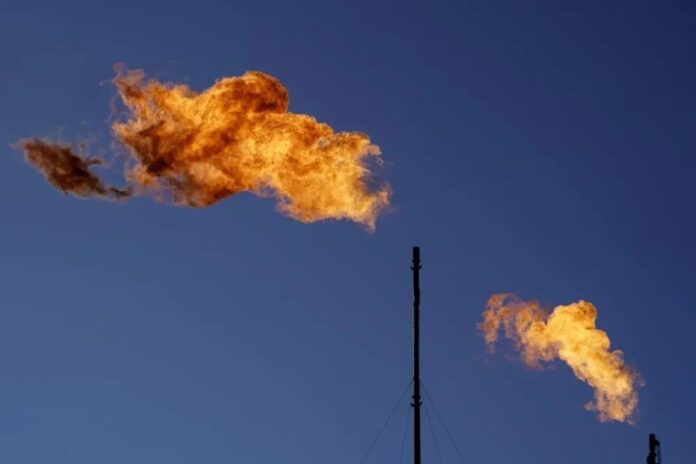Canada has a government-in-waiting that wants to axe the tax, referring to the federal levy on carbon emissions that is currently $65.00 CDN (approximately $50 US) per ton. The Liberal government is getting low poll results, and the Conservative opposition, if the trend holds, will likely form the next government either in 2024 or 2025. So the fossil fuel companies facing the latest regulatory announcement from the current government are making haste slowly, hoping to outwait the feds.
In the last month, Canada announced a plan to cap greenhouse gasses (GHGs) coming from the oil and gas sector to cut emissions to achieve 40-45% reductions from 2005 pollution levels by 2030. The government stated that this sector contributed 28% of national emissions in 2021 making it the largest carbon polluter in the country.
The response from the fossil fuel companies in light of the current government’s low polling numbers is to do as little as possible to help achieve the emissions cuts. Instead they are playing a wait-and-see game at least until the next election when they hope policy changes from a Conservative government will allow them to maintain the status quo.
Why Fossil Fuel Companies Are Reluctant to Decarbonize
Canada’s fossil fuel giants are acting no differently than the companies in the same sector elsewhere. Why is that? This is an industry that has traditionally received significant support from governments.
Just look at how the two Western Provinces in Canada that house oil producers responded to the latest government announcement of a pollution cap. Their governments went ballistic, slamming the proposal and calling it unnecessary. They were backed up by the federal Conservative opposition.
Go back three years and fossil fuel companies were jumping on the net-zero 2050 bandwagon. BP, the British-based fossil company announced then it planned to cut oil and gas production and rollout an ambitious program focused on renewables. Shell, the Dutch fossil fuel giant, facing court decisions in The Hague, was instructed to cut its carbon emissions by 45% from 2019 levels by 2030.
The Russian invasion of Ukraine and the imposition of oil and gas sanctions on Russia’s producers drove up the price of fossil fuels and created temporary shortages. The lure of profits proved to be a strong antidote helping to change the industry’s approach to environmental sustainability and decarbonization.
Exxon Mobil’s CEO, Darren Woods, in remarks made in 2022, urged his fellow energy producers to stop trying to pick winners and losers in the market. He was referring to renewable energy and carbon capture and sequestration projects. Woods warned that moving away from oil and gas immediately would be a disaster for the burgeoning renewable energy sector because the capacity to meet growing global energy needs would show the inability of these technologies to fulfill future, let alone short-term demand.
BP, Shell, Exxon Mobil and other oil and gas majors have revised the pace of their carbon reduction plans since the 2022 Russian-Ukraine war. They continue to make record earnings for shareholders.
COP28 and the Fossil Fuel Industry Phaseout
The debate at COP28, in Dubai just a month ago, was heavily focused on the fossil fuel industry and its contributions to climate change. There were clarion calls for phasing out the use of fossil fuels from many countries and organizations. But with the president of the conference also the head of a large oil company, the likelihood of success in agreeing to a timetable for a phaseout was seen as impossible. The negotiations ended with a phase down rather than a phaseout. The headlines screamed that the end of the fossil fuel era was at hand.
The final agreement included the 200 countries in attendance to triple renewable energy capacity and double energy efficiency improvements by 2030. The agreement also called for a phase down in the use of unabated-coal in thermal power plants. Unabated means coal-burning plants would need to adopt carbon capture technology. There was agreement as well to phase out “inefficient” fossil fuel subsidies. But the oil and gas majors remained standing on their feet by the end of the event.
The Winds of Politics Motivate Fossil Fuel Producers to Wait
In Canada, the industry’s response to the latest pollution caps has been we can wait out this government’s mandate and do nothing until the next federal election. A mid-December 2023 Reuter’s article headline contains the phrase dead “Anti-Oil & Gas” policies walking referring to the attitude of many fossil fuel producers in the country.
The CEO of small oil sands producer Yangarra Resources, Jim Evaskevich told Reuters:
“If we get to where we’re having to spend a lot of money to become way more draconian with our reductions, then we’re going to look at the federal election and go, ‘yeah no we’re not spending that money, no way.'”
The CEO of Bonterra Energy, a Western Canadian small natural gas producer, had similar thoughts. He is Pat Oliver and told Reuters:
“Say that we would have to spend significant capital [to comply with the new cap regulations], we would have a look at, is this government going to survive and what are the chances of this legislation surviving?”
These heads of small producers don’t feel as politically constrained as those leading Canada’s fossil fuel majors, but the sentiment among the latter is much the same.
















